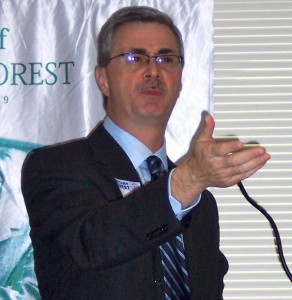City budget tackles fiscal woes
Kevin Beese — September 29, 2015
Ralph Martire, executive director of the Center for Tax and Budget Accountability, said with city pension payments more than doubling this fiscal year with no designated revenue to cover it, the city had no choice but to institute a property tax hike.
Tackling a financial albatross that has only grown during his time in office, Chicago Mayor Rahm Emnanuel has presented a city budget that will raise property taxes 11 percent over three years.
Financial analysts say the mayor had few choices in addressing city pension payments, which are more than doubling this fiscal year.
“He had no other option,” said Ralph Martire, executive director of the Center for Tax and Budget Accountability, a Chicago-based agency promoting social and economic justice through data-driven policy. “At the end of the day, he has to deal with what Mayor (Richard M.) Daley avoided for decades: dealing with the ledger side of the budget.
“Politically, (Daley) did not want to deal with it. He would rather provide services borrowing on current operations, using bonds and public pensions, selling off assets.”
Emanuel said his plan invests in youth, infrastructure and neighborhood services while reducing the city’s structural deficit and funding the inherited costs associated with police and firefighter pensions in a way that does not burden lower-income residents.
“On so many fronts, Chicago has made great progress by challenging the status quo. But as we continue to grow our economy, create jobs and attract families and businesses to Chicago, our fiscal challenges are blocking our path to even greater success,” Emanuel said. “With this budget, we will build on the progress in charting a new course for Chicago’s future and secure the retirements of our police and firefighters in a way that does not hurt those who can least afford it. I am confident we will be remembered as the leaders who made the hard choices and stepped up to save Chicago.”
The phased-in tax hike starts in this fiscal year (payable on property taxes paid in 2016) and continues through fiscal year 2017. Taxes will rise $109 million in 2016, $53 million in 2017 and $63 million in 2018 — all going toward the pensions of first responders.
CTBA’s Martire said the city has been operating under a system that could not sustain itself fiscally.
“Taking the net proceeds of bond and asset sales and using them to cover ongoing expenses?” Martire asked rhetorically. “I’d dare you to find any business textbook that says that is a good idea.”
Martire said with city pension payments more than doubling — going from $500 million to $1.2 million — this fiscal year with no designated revenue to cover it, the city had no choice but to institute a property tax hike.
“If the city didn’t turn to revenue, it would have to reduce expenses. It would have had to cut city positions by 20 percent, firefighters by 40 percent,” Martire said.
He said for years the city told residents what they wanted to hear, not what they needed to hear.
Martire said Emanuel didn’t do himself any favors waiting until this point to deal with the fiscal crisis.
“The challenges were made worse by him waiting so long to deal with it,” Martire said. “Since FY 2010, there have been increases in single obligations on the books.”
He said by building up the city’s rainy day fund with modest property tax increases the shock would not have been be as severe.
“But at some point the free lunch has to be repaid,” Martire said.
To address the city’s 2016 operating budget shortfall — separate from the police and fire pension obligations — Emanuel’s budget includes $170 million in savings and reforms, bringing the total saved for the past five years to $600 million. Some of those savings and reforms in 2016 include:
- Health care reforms and savings for active employees and retirees, saving $40 million
- Eliminating 150 vacant positions, saving $14 million
- Putting street sweeping on a grid, saving $3 million.
- Closing Central Business District tax increment financing districts and other TIF reforms, which will provide $113 million to the city, Chicago Public Schools and other local governments, the largest in years.
- Moving to “Grid 2.0” to further enhance garbage collection efficiency, saving an additional $9.5 million.
- Utilizing zero-based budgeting to reduce non-personnel costs by $21 million.
- Greening of city building infrastructure and energy hedging contracts, saving $16 million in energy costs.
–City budget tackles fiscal woes–



